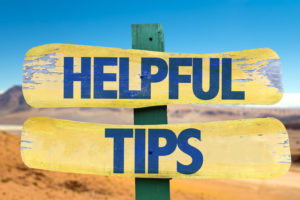7 RV Maintenance Tips for an Easy Road Trip
Contents
Ready to make that first trip of the summer in your RV?
There are few seasons more exciting than summer for those who live the RV part or full-time, and with good reason. Amusement parks are open, water at the beach is amazing, and the mountain forests and streams beckon explorers seeking refuge from the heat in the lowlands. As exciting as that first trip of the year may be, there are a few maintenance chores that you need to take care of before setting out.

Proper RV Maintenance for A Fun and Easy Road Trip
Here are 7 RV maintenance tips to make your next road trip in your RV easy and memorable.
1. Check Your Seams and Seals
This is something you should be doing no less than every three months anyway, but before you head out on a trip make sure your roof and seams are all watertight.
Inspect the seals around all roof edges, vents, skylights, and AC unit for signs of water leakage into your RV. Once water gets inside the walls of your RV, it can cause far-reaching and expensive damage. Patch any leaks you do find with a good quality sealant, and make sure whatever you do use is compatible with the material of your roof (fiberglass, metal, rubber, ALFA, TPO, etc.).
Keep a couple tubes handy for when you are out on the road, too: sometimes seals and seams shifting during travel creates a new leak while you are driving.
2. Check Your Wheels Lug Nut and Tire Pressure
Blown tires and thrown wheels on the highway are bad enough when you are driving a car or truck, but they are even worse in an RV.
Tighten up all the lug nuts on all four wheels before you roll out for your trip, and check the tire pressure to make sure it is at the correct setting while you are at it. Proper tire pressure helps improve fuel economy, and if your RV has been sitting for a while and undergoing temperature changes, the tires may have lost a significant amount of air. Additionally, loose lug nuts are dangerous enough on their own, but combined with overinflated or under-inflated tires they are a recipe for disaster.
No matter how you look at it, replacing wheels and tires on an RV is going to be an expensive proposition, so always make sure everything is in good condition and ready to roll safely before a trip.
3. Test All Your RV’s Batteries
Nobody likes a blackout on a camping trip, or going to start up the RV and finding the battery is dead. RV batteries for tow-along and self-propelled models need to be kept charged even when not in use, so make sure you are testing and charging your battery when it’s not in use at least once or twice a month.
RV batteries have a lifespan of 3-5 years if kept in good condition, so you may find it’s time to change it out before your next road trip after testing.
4. Condition the Waste Water System
Both your gray and black water systems in your RV require regular chemical treatment to stay operational. Flush your wastewater regularly, and make sure you have enough of the treatment fluid for each system before filling it back up. Proper wastewater maintenance prevents buildup that leads to clogging and system failure, both of which you don’t want to have to deal with while on a road trip.
5. Get Your Brakes Checked
Keep your wheel bearings lubricated during the summer when warm weather tends to cause lubricants to run, and examine your brake pads and discs to make sure they aren’t too thin. Do a braking test in a parking lot or deserted road to make sure everything is functioning properly.
An RV brake repair or replacement usually costs around $300-500 on average, so keeping your brakes in good shape is essential for safety and financial reasons.
6. Clean and Lubricate all Slides and Seals
Got slideouts? Make sure they are operating smoothly before you leave, test all motors, and make sure the slide rails are clean and well lubricated.
Failing to maintain slides and seals around slides can lead to catching or sticking, both of which will burn out motors in a hurry. Avoid the expensive repair and keep these in good working order.
7. Change Your Oil and All Filters
Generally, this only needs to be done once a year, but it is important for RVs that sit in place most of the year since the buildup and varnishes tend to harden over time. Checking and changing out your air, fuel, coolant, and hydraulic filters before you roll out for the year is also critical, as you don’t want an expensive repair that could have been avoided by simply replacing a worn out or clogged filter beforehand.
Keeping Your RV Vacation Ready
Once you’ve performed these 7 maintenance chores, your RV should be ready to hit the road for another season.
Not confident in your own RV maintenance abilities? Prefer to have an expert take a look? If you are local to Everett, WA, stop by Kirkland RV and have our expert team of RV maintenance specialists help you get ready to roll out for the year.

